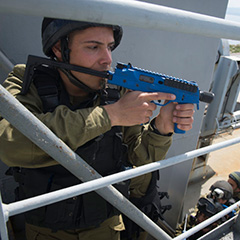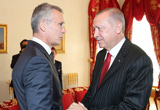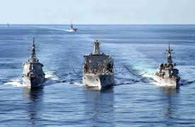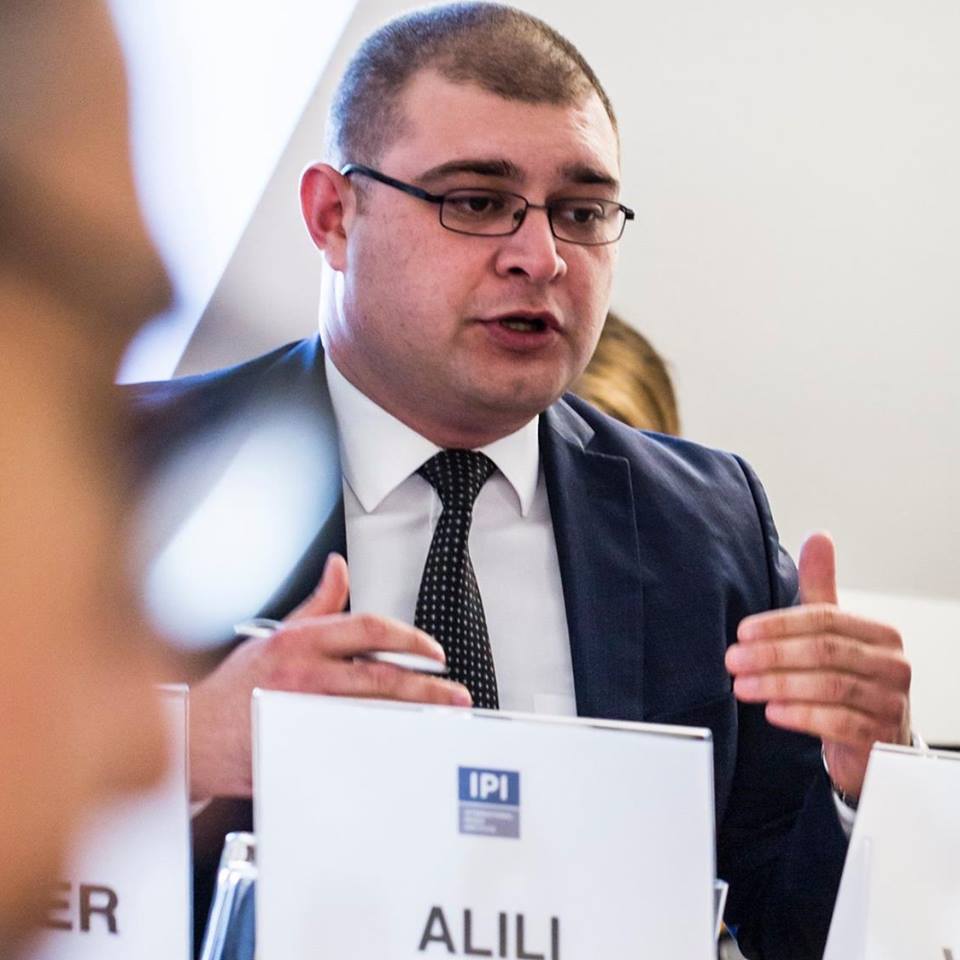How to Break the Current Deadlock in Nagorno-Karabakh Conflict Resolution: Strategic Dialogue on the Peace Process within a Boosted Peace Context?[Over]
2020 Research Digest, edited by George Vlad NICULESCU, EGF Head of Research
The 2020 European Geopolitical Forum Research Digest aimed to explore the resilience of the Nagorno-Karabakh (NK) peace process driven by the implementation of the Madrid/Basic Principles, and the increased relevance of the peace context, created by various initiatives aiming to incentivize peaceful conflict resolution. It consists of three research papers drafted by distinguished Armenian, Azerbaijani, and Russian experts, who have been invited to respond generic questions such as: Are the Madrid Principles really dead? Why haven’t they been implemented so far? What are the Armenian perceived downsides of the Madrid Principles as the most plausible option for the Karabakh conflict resolution? Why does Azerbaijan support the Madrid Principles, and why does Baku believe they could still lead the way to a breakthrough in the peace process? What structural, institutional, conceptual, or operational changes could unblock the NK peace process, while taking advantage from a much needed boost of the peace context? READ MORE
Expert Peer-Review
 By Alan Whitehorn, Professor Emeritus in Political Science, The Royal Military College of Canada
By Alan Whitehorn, Professor Emeritus in Political Science, The Royal Military College of Canada
When there is so much shelling and yelling in the South Caucasus conflict over Nagorno-Karabakh, it is helpful to read a collection of thoughtful essays by knowledgeable authors from several differing countries and perspectives that appeared in The European Geopolitical Forum. Each piece is a welcome contribution, but nevertheless has key gaps and issues. I will comment on each in the order in which they appear. READ THE REVIEW
Nagorno-Karabakh Crisis: Azerbaijan’s Fraying Temper[Over]  By Khayal Iskandarov Ibrahim, Rashad Tahirov Kamal, PhD in philology, associate professor Sadi Sadiyev Saleh By Khayal Iskandarov Ibrahim, Rashad Tahirov Kamal, PhD in philology, associate professor Sadi Sadiyev Saleh
Another escalation in Nagorno-Karabakh in early morning on September 27, 2020 brought Armenian-Azerbaijani conflict once again to the focus of world community. Approximately 30 years have elapsed since this conflict was initiated. However, there has not been any substantial progress in the efforts to solve the problem. The prominent political figures in Armenia, who more or less understood the consequences of their actions and endeavored to solve the problem, were either ousted or assassinated. READ MORE.
New War in Nagorno-Karabakh and the Role of Great Powers: What is Next?[Over]  By Benyamin Poghosyan, PhD, Chairman, Center for Political and Economic Strategic Studies By Benyamin Poghosyan, PhD, Chairman, Center for Political and Economic Strategic Studies
On September 27, 2020, Azerbaijan launched a large-scale attack along the whole line of contact with the Nagorno Karabakh Republic. This was the third flare-up in Karabakh conflict in recent four years. In April 2016, Azerbaijan again launched an attack on Karabakh, however, hostilities were stopped after four days as a result of active Russian mediation efforts without any significant changes on the ground. In July 2020, clashes broke out along the northern part of Armenia – Azerbaijan international border. However, the September 2020 attack has few in common with both April 2016 four day war and July 2020 border skirmishes. READ MORE
The Recent Evolution of Azerbaijan–Turkey–Armenia–Russia Relations and Its Implications for the Settlement of the Karabakh Conflict[Over]  By Benyamin Poghosyan, PhD, Chairman, Center for Political and Economic Strategic Studies By Benyamin Poghosyan, PhD, Chairman, Center for Political and Economic Strategic Studies
The July 2020 escalation along Armenia – Azerbaijan international border and following events have again put Armenia – Russia – Azerbaijan – Turkey relations in the spotlight of media and expert community. In recent years there was a wide spread perception that Azerbaijan has been making efforts to improve its relations with Russia, while Armenia – Russia relations entered an unchartered waters after the 2018 “Velvet revolution”. The large scale purchases of Russian modern weaponry by Azerbaijan were the main driver of improving bilateral relations. READ MORE
A Tangled Tale[Over]  By Benyamin Poghosyan, PhD, Chairman, Center for Political and Economic Strategic Studies By Benyamin Poghosyan, PhD, Chairman, Center for Political and Economic Strategic Studies
Tensions in the Aegean between Turkey and Greece have found an echo in the South Caucasus, with the risk of somewhat unpredictable consequences.
Tensions in the Eastern Mediterranean, between Turkey on the one hand, and Greece, Cyprus, Egypt, UAE and France, on the other, simmered over the summer period. There is a long history of Turkey - Greece disputes and conflicts, since the end of the WWII, such as events in 1974-1976, 1987, and 1995-1996; but the current situation can be described as unprecedented. The region now faces several intertwined conflicts: the proxy war in Libya; divergent views on the issues of demarcation in the eastern Mediterranean; and the fight for the control of large resources of natural gas and their transit routes. In the background is also the intra-Muslim struggle between the Muslim Brotherhood movement supported by Turkey and Qatar, but staunchly opposed by the Gulf monarchies and Egypt. READ MORE
- September 30, 2020 09:21AM
Trends and Factors Contributing to the July Border Clashes Between Azerbaijan and Armenia[Over]  By Fuad Shahbazov, Baku-based independent regional security and defence analyst By Fuad Shahbazov, Baku-based independent regional security and defence analyst
On July 12, the Azerbaijani border region of Tovuz and the Tavush region on the Armenian side became the new epicentre of clashes between the armed forces of the two states, with the involvement of heavy artillery and unmanned aerial drones. The intensive exchanges of fire resulted in the deaths of over a dozen military personnel and the destruction of local infrastructure on both sides. On July 14, Azerbaijan’s Ministry of Defense notably confirmed the deaths of Major General Polad Hashimov and Colonel Ilgar Mirzayev as a result of artillery shelling by Armenian military units. READ MORE
- September 23, 2020 08:54AM
Despite US opposition, Turkey prepares to buy another batch of Russian S-400[Over]  By Benyamin Poghosyan, PhD, Chairman, Center for Political and Economic Strategic Studies By Benyamin Poghosyan, PhD, Chairman, Center for Political and Economic Strategic Studies
A managed process of co-operation and competition continues to characterise Turkish-Russian relations, and in the future this may also extend to the South Caucasus.
Russia-Turkey relations have experienced significant ups and downs in recent years: The warming of relations at the beginning of the 2010s; the crisis after the November 2015 shooting of a Russian military jet; the new phase of partnership from late 2016 to 2019; the new crisis as a result of direct military clashes in Syrian Idlib in January-February 2020 and Turkish support of the Government of National Accord in Libya; and another phase of normalisation after the March 5 agreement on Idlib was reached by the two presidents. READ MORE
- September 12, 2020 10:22AM
Escalation along Armenia – Azerbaijan Border: Key Reasons and Possible Scenarios[Over]  By Benyamin Poghosyan, PhD, Chairman, Center for Political and Economic Strategic Studies By Benyamin Poghosyan, PhD, Chairman, Center for Political and Economic Strategic Studies
On July 12, Azerbaijani forces attempted to take over an Armenian post along the Northern part of the Armenia–Azerbaijan international border. Repelled by the Armenian units, they turned to cannon shelling and the extensive use of UAVs. After two days of active clashes, the situation was calm on July 15, when new, albeit unsuccessful, attempts to seize Armenian positions were made on early morning of July 16. While five days of hostilities did not bring significant changes on the ground, it might be useful to understand the key reasons behind these recent military activities, as well as to assess possible scenarios for the future. READ MORE
Russia–Turkey Strategic Rivalry in the South Caucasus[Over]  By Benyamin Poghosyan, PhD, Chairman, Center for Political and Economic Strategic Studies By Benyamin Poghosyan, PhD, Chairman, Center for Political and Economic Strategic Studies
Despite the COVID-19 outbreak, Russia has made recently fresh efforts to push forward the phased approach solution in Nagorno Karabakh. This solution is based on the so-called “Madrid principles and six basic elements” first publicized by the Russian, US, and French Presidents’ July 2009 statement. However, the phased approach solution traces back to late 1997 when apparent push by OSCE Co-Chair states to reach an agreement resulted in the resignation of the first President of Armenia. After 6 years break, this logic again appeared to have dominated the settlement process since 2004. Six elements envisage the withdrawal of Nagorno Karabakh Republic’s forces from more than 50 percent of its territory, deployment of peacekeeping forces, and the final determination of Karabakh status by legally binding expression of will. READ MORE
Military Cooperation between Israel, Greece and Cyprus[Over]  By Eugene Kogan, Tbilisi-based defence and security expert
By Eugene Kogan, Tbilisi-based defence and security expert
The trilateral military cooperation, begun in November 2017, has all the necessary components to become decisive for the three countries in the eastern Mediterranean in the long-term. In addition, the US is fully behind the three countries, sending a clear signal to Ankara not to provoke conflict in the region.
Turkey, which is still a member of NATO, is not in a position to prevent Israel from cooperating with NATO, although such cooperation is a thorn in the side of Turkey. Although Cypriot military exercises with Israel upset Turkey, it cannot prevent the two countries from cooperating. That is why we see a new military architecture in the Eastern Mediterranean, which will shape the security relations of the three countries in the coming years. READ MORE
How the EU Could Help Re-energize Peace Processes in the Eastern Partnership[Over]  By Elkhan Nuriyev, Humboldt Senior Fellow, Centre for East European and International Studies By Elkhan Nuriyev, Humboldt Senior Fellow, Centre for East European and International Studies
Almost three decades on from the fall of communism, the European Union’s Eastern neighborhood remains embroiled in protracted conflicts that have hampered regional integration, bred mistrust, and encouraged wasteful military spending. This is mainly because the leaders of the Eastern Partnership countries—Armenia, Azerbaijan, Belarus, Georgia, Moldova, and Ukraine—lack flexible reconciliation strategies that may help build peace and foster political stability and economic prosperity.
Complex lingering conflicts have made the European Union’s Eastern partners the objects of a damaging geopolitical tussle between Russia and the EU.
READ MORE
What’s Next in Karabakh…[Over]  By Benyamin Poghosyan, PhD, Chairman, Center for Political and Economic Strategic Studies By Benyamin Poghosyan, PhD, Chairman, Center for Political and Economic Strategic Studies
The April 21, 2020 statements of Russian foreign Minister Lavrov brought back Nagorno Karabakh issue to the forefront of expert discussions. However, Russian foreign minister did not reveal something special or unexpected. He just reiterated what pundits following the conflict settlement process had already known. Since May 2018 negotiations have been based on a phased approach. It envisaged the return of some territories to Azerbaijan and indefinite postponement of the determination of the Nagorno Karabakh final status. READ MORE
Why “The Land for Promise” Formula Will Never Be Accepted[Over]  By Benyamin Poghosyan, PhD, Chairman, Center for Political and Economic Strategic Studies By Benyamin Poghosyan, PhD, Chairman, Center for Political and Economic Strategic Studies
Despite the worldwide standstill brought by the COVID–19 pandemic, conflict resolutions remain among the key priorities of the international community. This is true for the Nagorno Karabakh conflict too. Without going deep into history it’s worthy to recall the key milestones of the conflict. The Nagorno Karabakh Autonomous Region declared its intention to leave Soviet Azerbaijan and join Soviet Armenia in February 1988. In the final days of the Soviet Union, Nagorno Karabakh organized a referendum and declared its independence. Almost immediately Azerbaijan launched a military attack against Nagorno Karabakh seeking to crash the newly established republic. READ MORE
Why is Lavrov Pushing for a Karabakh Agreement?[Over]  By Benyamin Poghosyan, PhD, Chairman, Center for Political and Economic Strategic Studies By Benyamin Poghosyan, PhD, Chairman, Center for Political and Economic Strategic Studies
As the world mobilizes to combat the COVID - 19 it sometimes appears that the pandemic has stopped geopolitics. Many urgent topics of international relations have been put aside. However, sooner or later the world will return to normality, and the old problems will re-emerge. Coronavirus has not decreased US - China rivalry, to the contrary the Post COVID-19 world will likely be characterized by a growing confrontation between China and the US. Among the problems waiting their turn to re-emerge in the geopolitical landscape in the post-Soviet space is the Nagorno Karabakh conflict. READ MORE
Turkey-NATO Relations: Strained and Constrained[Over]  By Eugene Kogan, Tbilisi-based defence and security expert By Eugene Kogan, Tbilisi-based defence and security expert
Turkey-NATO relations have a history of challenges more or less since Turkey’s accession to NATO in 1952. Strained relations between Turkey and NATO have begun long before Turkey’s alleged failed coup attempt on 15 July 2016. However, the failed coup attempt increased tensions further and it is fair to assume that these tense relations are likely to continue. At the same time, Turkey-NATO relations are constrained by a not yet amended North Atlantic Treaty of 4 April 1949. As long as the treaty remains not updated very little can be done to change the nature of Turkey-NATO relations. READ MORE.
What Next in Idlib?[Over]  By Benyamin Poghosyan, PhD, Chairman, Center for Political and Economic Strategic Studies By Benyamin Poghosyan, PhD, Chairman, Center for Political and Economic Strategic Studies
In recent weeks the Syrian province of Idlib has been transformed into the hot spot of the Middle East. There were frantic flows of calls, meetings and visits between Russian, Turkish and Western officials. Some were seeking to deescalate the situation and prevent direct confrontation between Russian and Turkish troops, others were trying to use this situation and drive a wedge between Moscow and Ankara. Everything is pretty much clear – Turkey wants to keep Idlib under its control and use it as a tool to secure its influence in post–war Syria, while Russia is interested to finish the active phase of military operations and speed up the political process. READ MORE
President Trump’s Middle East Peace Plan: Possible Implications for Armenia[Over]  By Benyamin Poghosyan, PhD, Chairman, Center for Political and Economic Strategic Studies By Benyamin Poghosyan, PhD, Chairman, Center for Political and Economic Strategic Studies
On January 28, 2020 President Trump unveiled his much long waited peace plan for the Israeli – Palestinian conflict. The plan was warmly welcomed by the Israeli Prime Minister Benyamin Netanyahu and Israeli opposition leader General Gantz. Simultaneously, it was sharply criticized by the Palestinian leader Mahmoud Abbas, who told that it belonged to the dustbin of history, and by Hamas leaders who stated that Palestinians would confront that deal. Turkish President Erdogan called it a plan to ignore the rights of Palestinians and legitimize Israel’s occupation. READ MORE
- February 17, 2020 23:16PM
Opinion on Geostrategic Implications of BREXIT[Over]  By Benyamin Poghosyan, PhD, Chairman, Center for Political and Economic Strategic Studies By Benyamin Poghosyan, PhD, Chairman, Center for Political and Economic Strategic Studies
The United Kingdom (UK) is leaving the European Union (EU) on January 31, 2020. This move will not only have tremendous geostrategic implications for the UK and EU but possibly may influence the transformation of the Post-Cold War order. First of all, for the first time in at least the recent 400 hundred years, the UK is abandoning its status of the "first-tier country" and most probably, will never return to the elite club. Without the UK, the struggle between continental Europe and the Ocean powers (US and UK), may reemerge again. READ MORE
- February 10, 2020 18:41PM
Madrid Principles and Elements Need New Update[Over]  By Benyamin Poghosyan, Chairman, Center for Political and Economic Strategic Studies, Yerevan By Benyamin Poghosyan, Chairman, Center for Political and Economic Strategic Studies, Yerevan
Since the start of the negotiations for the peaceful settlement of the Karabakh conflict all options suggested by the mediators have envisaged the return of some territories under the control of Nagorno-Karabakh to Azerbaijan. Meanwhile, till now, Armenia and Nagorno-Karabakh have managed to avoid such a scenario. However, this didn’t always happen for reasons under Armenian leaders’ control. READ MORE
On Karabakh the Focus should Be on Confidence-Building Measures[Over]  By Benyamin Poghosyan, PhD, Executive Director, Political Science Association of Armenia By Benyamin Poghosyan, PhD, Executive Director, Political Science Association of Armenia
The Karabakh conflict settlement process continues to interest regional security pundits. Yet, despite the growing optimism after the "Velvet revolution" in Armenia, in recent months, the prevailing mood has been more pessimistic. The two meetings between the leaders of Armenia and Azerbaijan at the beginning of 2019, and negotiations at the level of the foreign ministers, did not result in any breakthrough. The significant decrease in the number of incidents along the line of contact and on the Armenia-Azerbaijan international border since October 2018 is a positive step, although one can also see recent increases in clashes resulting in casualties on both sides. READ MORE
NATO’s Strategy Towards the Black Sea Region[Over]  By Eugene Kogan, Tbilisi-based defence and security expert By Eugene Kogan, Tbilisi-based defence and security expert
Although the pursuit of compromises and negotiations with Russia are an unwritten rule for countries such as Bulgaria and Turkey, such pursuits damage NATO as a whole. Bulgaria, Romania and Turkey remind us of the famous fable ‘Swan, Pike and Crawfish’- by Ivan Krylov: “When partners can’t agree their dealings come to a naught and trouble is their labor’s only fruit,” while Russia is joyfully rubbing its hands and laughing behind NATO’s back. READ MORE
Pashinyan's New Tactic: 'Tougher in Public, Softer at the Negotiation Table'[Over]  By Ahmad Alili, Head of Research, Caucasus Policy Analysis Center, Baku
By Ahmad Alili, Head of Research, Caucasus Policy Analysis Center, Baku
The next meeting between the Ministers of Foreign Affairs of Armenia and Azerbaijan will be held in the upcoming days, most likely during the UN General Assembly in New York. This is the first meeting following Armenian Prime Minister Nikol Pashinyan's "Unification" speech on 5 August in Nagorno-Karabakh, which contained an unprecedented hardline rhetoric, hurting both 'Track1' and 'Track2' processes, which shocked Baku. Following the speech, Azerbaijani officials called for a reaction from the OSCE Minsk Group co-chairs. READ MORE
Gulf Tensions May Spill Over into the Caucasus[Over]  By Benyamin Poghosyan, PhD, Executive Director, Political Science Association of Armenia By Benyamin Poghosyan, PhD, Executive Director, Political Science Association of Armenia
The September 14th attacks against Saudi Arabia's oil facilities have dangerously increased tensions in the Middle East. Regardless of the author of these actions - the Houthi rebels from Yemen or the Islamic Revolutionary Guard Corps using Iraqi or Iranian territories - a clear message was sent to the Gulf monarchies and the US: Iran on its own or through its proxy forces is capable of inflicting serious damage to the Gulf States’ vital interests, and the "maximum economic pressure" campaign led by the US since May 2018 has as yet failed to change Iranian regional policy. READ MORE
‘Game of Thrones Moment' for Azerbaijan in Nagorno-Karabakh[Over]  By Ahmad Alili, Head of Research, Caucasus Policy Analysis Center, Baku
By Ahmad Alili, Head of Research, Caucasus Policy Analysis Center, Baku
In the real world, we do not have dragons, faceless men, red woman, white walkers or resurrection from the dead. Yet, the public policy challenges facing advisers in the famous Game of Thrones (GoT) TV show mirror those that political advisors to real governments face. We draw parallels to the real world in the way the show's decision-makers and advisers face the same limitations of time, resources and information bias. READ MORE
- September 24, 2019 21:39PM
Is Russia Cultivating ‘Symmetric Separatism’ in Karabakh?[Over]  By Eduard Abrahamyan, Wider Black Sea & Central Asia regional security analyst By Eduard Abrahamyan, Wider Black Sea & Central Asia regional security analyst
Moscow’s mistrust of the Armenian government headed by Prime Minister Nikol Pashinyan dates all the way back to his rise to power last year in the so-called “Velvet Revolution.” And that mistrust has persisted despite Pashinyan’s various foreign policy gambits designed to win Russia’s confidence (see EDM, March 21). At the same time, Pashinyan’s domestic agenda—specifically, his determination to dismantle the previous regime’s oligarchic/kleptocratic order, including by prosecuting former president Robert Kocharyan for abuses of power—seems to be increasingly irking Moscow as well. READ MORE
- September 16, 2019 21:43PM
|
|